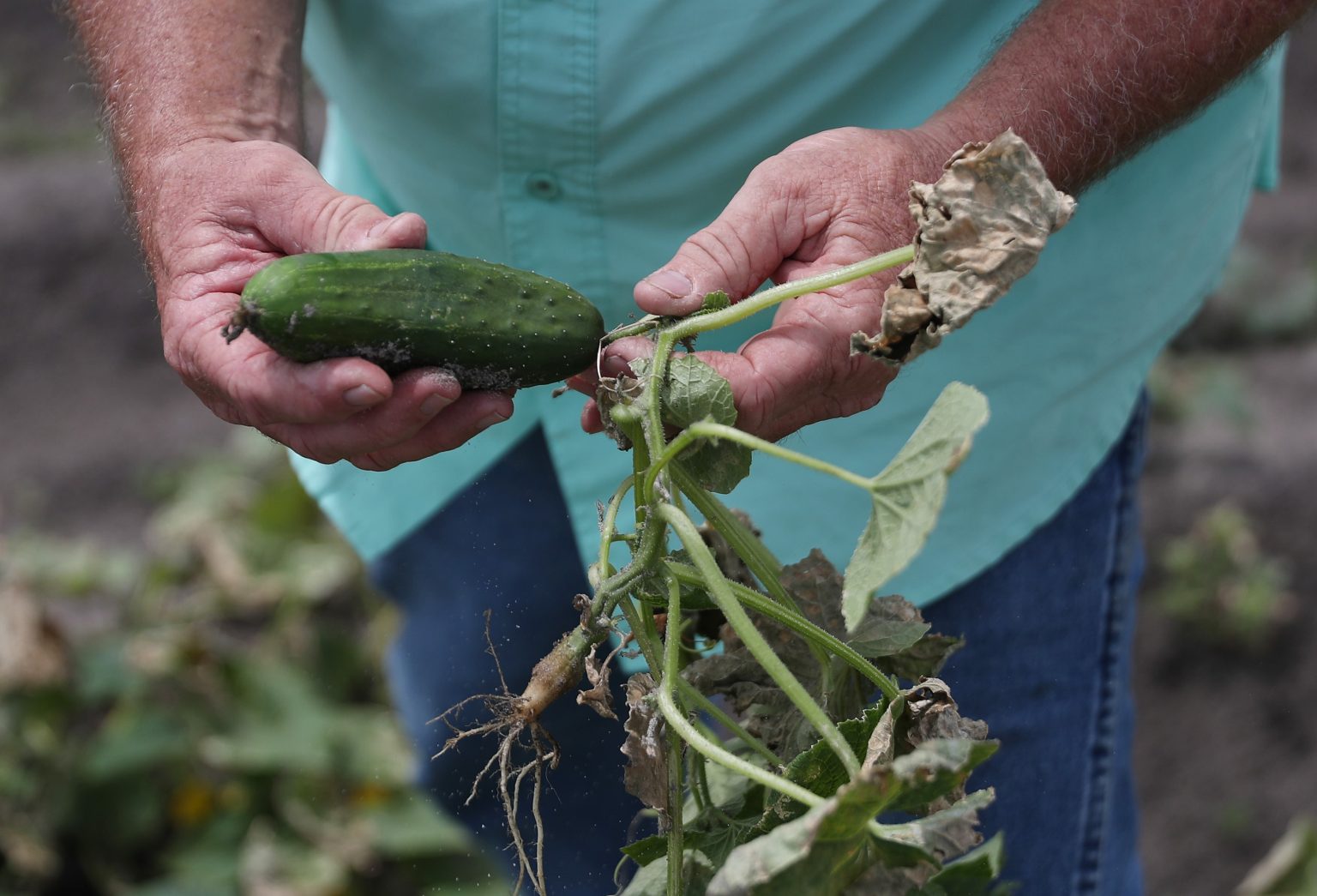Summarize this content to 2000 words in 6 paragraphs Prepared lunches, including wraps and salads, have been yanked from the shelves amid fears they could be contaminated with potentially deadly salmonella bacteria.A recall of various products that may contain contaminated cucumbers was classified by the Food and Drug Administration (FDA) at the highest possible health risk on Thursday—a move that affects consumers in a string of states.Russ Davis Wholesale of Wadena, Minnesota, voluntarily initiated the wrap and salad recalls on December 1 amid fears about a Mexican supplier’s cucumbers, and on January 2 the FDA revealed its assessment of the possible health risk.FDA documents last month said: “No illnesses have been reported to Russ Davis Wholesale in connection with this problem.” Newsweek reached out to Russ Davis Wholesale via a contact form on its website for comment outside normal business hours.
A farmer examines a cucumber in a field in Florida. Various food products have been recalled over the past couple months amid fears that cucumbers could be contaminated with salmonella.
A farmer examines a cucumber in a field in Florida. Various food products have been recalled over the past couple months amid fears that cucumbers could be contaminated with salmonella.
Joe Raedle/Getty Images
Why It MattersSeveral people have fallen ill with salmonellosis (the illness caused by the salmonella bacteria) across the U.S. and officials have been trying to trace the source of the outbreak. The investigation remains ongoing.Food poisoning is caused by consuming a meal contaminated with certain germs, such as salmonella or E. coli. Victims typically suffer from diarrhea, stomach cramps, vomiting and fever. Symptoms can be from mild to serious and may last for a few hours or even several days. The condition can be life-threatening for vulnerable groups, such as very young children, the elderly and people with weakened immune systems.What To KnowGiven that salmonella can potentially prove deadly for some sufferers, the FDA recognized the severity of the recall late last week. On Thursday, officials classified the Russ Davis Wholesale recalls as a Class I health hazard, the most severe type of warning, encompassing the potential for “serious adverse health consequences or death” for consumers.The recall launched by Russ Davis Wholesale in December concerned Bacon AvocadoWraps, Turkey Havarti Wraps and 14-ounce packages of Garden Salad. The products were sold under the brand names Crazy Fresh, Quick & Easy and Kowalski’s Markets.All three products contained cucumbers that “have potential to be contaminated with Salmonella,” according to FDA documents. The meals were distributed in Illinois, Iowa, Kansas, Michigan, Minnesota, Montana, Nebraska, North Dakota, South Dakota, Wisconsin and Wyoming.FDA documents last month said: “No illnesses have been reported to Russ Davis Wholesale in connection with this problem.”The cucumbers in question had reportedly originated from grower Agrotato S.A. de C.V. in Sonora, Mexico, sold in the U.S. beginning in mid-October. A string of U.S. firms, including Russ Davis Wholesale, were subsequently affected, sparking a slew of food recalls across the country. Russ Davis Wholesale had reportedly bought the cucumbers from Arizona-based Baloian Farms, which had imported them from the Mexican grower. Newsweek previously contacted Baloian Farms for comment.What People Are SayingLisa R. Robinson, vice president of global food safety and public health at Ecolab, previously told Newsweek: “Foodborne diseases can be quite serious—even deadly. The challenge is that the pathogens responsible for foodborne illness are all naturally occurring. Salmonella and E. coli, for example, can be found in the gut biome of chickens and cattle. Cronobacter and listeria are even more present—they can be found in soil and fields, so they’re easily tracked from one environment to another.”What Happens NextThe status of the recall remains “ongoing,” according to the FDA, while officials are likely to continue their investigation into the potential salmonella contamination.


